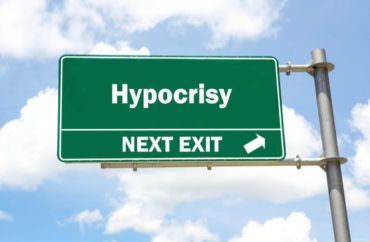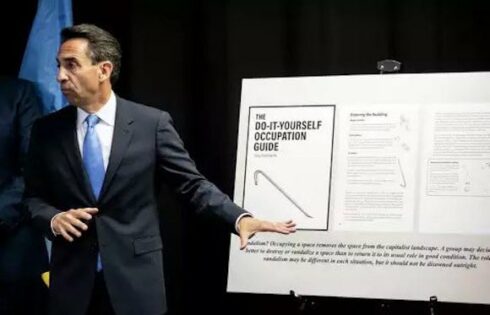
Not legal to target Christians without an ‘all comers’ policy
The University of Iowa offers safe spaces for racial minorities. It bans them for religious groups.
The public university’s disparate treatment of certain student groups, based on their composition and viewpoint, must be ruled unconstitutional, according to a Christian student organization in a legal filing Thursday.
InterVarsity Christian Fellowship asked a federal court to issue summary judgment against the university after it admitted in a different lawsuit that it creates numerous exceptions to its antidiscrimination policy, including to provide “safe spaces for minorities which have historically been the victims of discrimination.”
This “gerrymandered position … retains accommodations for virtually everyone but disfavored religious groups,” the Christian group argued.
The 8th U.S. Circuit Court of Appeals, whose rulings are binding on the university, imposed an expensive lesson on its neighbor Iowa State University for its viewpoint-based discrimination against marijuana-reform activists, said the filing.
The Becket law firm, which is representing InterVarsity, said there was nothing left to argue in court because the university “admit religious discrimination” in its Nov. 5 filing opposing summary judgment.
Though the administration “temporarily reinstated” religious groups representing Sikhs, Muslims, Latter-Day Saints and Chinese Christians after InterVarsity filed suit, it “continues to resist a permanent fix and insist that it can treat religious groups different from other groups,” Becket wrote.
“Now, even encouraging leaders of religious groups to affirm the fundamental tenets of the group’s faith—such as the Shema or the Shahada or the Nicene Creed—is deemed by the University to be rank ‘religious discrimination,'” the filing said, citing the demand first made of InterVarsity this summer.
Must discriminate to allow ‘safe spaces for minorities’ who faced discrimination
The University of Iowa’s decision to revoke recognition from dozens of religious groups followed a court ruling in favor of another Christian group, Business Leaders in Christ, that said it was singled out for derecognition out of many groups that require leaders to observe their own faith.
In its filing last month against BLC’s motion for summary judgment, the university argued that how to treat religious groups that exclude some students from leadership roles was a “rapidly-developing and unsettled area of law.” (Becket also represents BLC.)
What’s clear is it “cannot fund, with taxpayer money,” groups that “openly” discriminate against students based on sexual orientation and gender. That refers mostly to Christian groups whose written bylaws require leaders to affirm biblical teaching on sexuality.
InterVarsity previously complained in a dispute with the California State University system that other groups discriminate on the basis of religion in unwritten policies.
It seized on a portion of the university’s BLC filing that answers criticism that “various clubs, sports teams, and even scholarship programs” violate the university’s human rights policy, the basis for its derecognition of religious groups.
“These groups have been permitted to continue to exist as [registered student organizations] in spite of their apparent violations of the Policy for a variety of reasons—including administrative oversight by the University—but also for reasons which support the University’s educational mission,” the university wrote:
For example, multiple groups provide safe spaces for minorities which have historically been the victims of discrimination, and many of the groups with which Plaintiff takes issue exist in compliance with federal laws like Title IX, which permits separate sports teams and housing options for men and women. …
It is illogical for BLinC to make a claim of viewpoint discrimination while simultaneously pointing to groups which set forth identical conservative Christian views on homosexuality and yet have not been deregistered due to their willingness to comply with the Human Rights Policy.
Because there’s a “triable issue of material fact” on BLC’s claim that the university discriminated against it, and the administration’s claim that “the differences in application of the policy were a mixture of administrative oversight and justified exceptions to the policy,” the club’s motion should be rejected.
The university said the Iowa federal court was ignoring the “reality” that its process is “complaint-driven,” even though the court found that no one complained about a previous group that was investigated for leadership requirements, the Christian Legal Society.
‘Swiss-cheese interpretation’ that functionally exempts ‘socially acceptable’ groups
InterVarsity, which was also derecognized without evidence of a filed complaint, said the administration’s legal response to BLC “just made a bad situation worse.”
The university has explicitly admitted that it jettisoned a decades-old “common-sense approach” applied across the board to Greeks, minorities and religious groups, among others, “to pursue their distinct missions by selecting leaders who sincerely embraced those missions.”
Rather than continue this precedent or “strictly” apply its human rights policy to all such groups, the university imposed a “gerrymandered position” that picks and chooses which groups will receive scrutiny – in this case, only “disfavored religious groups.”
InterVarsity mocked the university for its “swiss-cheese interpretation” of its policy under the First Amendment. “If there is room at the University for single-sex clubs and ideology-driven student groups of every stripe (and there ought to be), then there must also be room for religious groups that need their leaders to be religious,” since they hold “inherently expressive positions.”
This does not even consider the First Amendment’s religion clause, which explicitly prohibits the state’s “targeted entanglement in religious leadership selection,” InterVarsity argued.
The administration’s alleged safe space in the Supreme Court’s Martinez ruling, which involved the Christian Legal Society, isn’t applicable to the University of Iowa as it believes, according to Thursday’s motion.
That ruling only applied to universities that “mandate acceptance of all comers,” which would require the University of Iowa to strictly apply its human rights policy to Greeks, minorities and political groups among others. The Supreme Court ruled out policies that “target solely those groups whose beliefs are based on religion.”
InterVarsity asked the Iowa federal court to recognize the “significant spiritual commitments” required of its student leaders, “including leading worship, teaching Bible studies, and conducting prayer and other religious services.”
Even if the process were truly complaint-driven, it would be “far more likely” to target “unpopular or minority viewpoints,” the filing said.
The administration “can knowingly turn a ‘blind eye’ to Policy violations that would otherwise be controversial to enforce because they are socially acceptable to the University culture, such as in the context of sports and some Greek groups.”
The university’s hypocrisy with regard to Greeks in particular is stunning, InterVarsity argued: It punishes the Christian group “for its religious selection of the 3-4 leadership positions open each year” while exempting 10 percent of students groups that “annually exclude half of humanity from thousands of possible membership positions.”
If the university’s selective enforcement of its policy is allowed to stand, InterVarsity would be “forced to accept” leaders “who reject its faith [,which] would undermine InterVarsity’s religious message, mission, and identity.”
It is “Orwellian” to discriminate against religious groups in the name of nondiscrimination, Becket senior counsel Daniel Blomberg said in a statement.
“Real diversity requires real differences. The university has – quite rightly – long respected the differences inherent in Greek groups, sports clubs, and ideological groups,” he said. “The First Amendment requires the university to do the same for religious groups.”
IMAGE: northallertonman/Shutterstock
Like The College Fix on Facebook / Follow us on Twitter







Please join the conversation about our stories on Facebook, Twitter, Instagram, Reddit, MeWe, Rumble, Gab, Minds and Gettr.